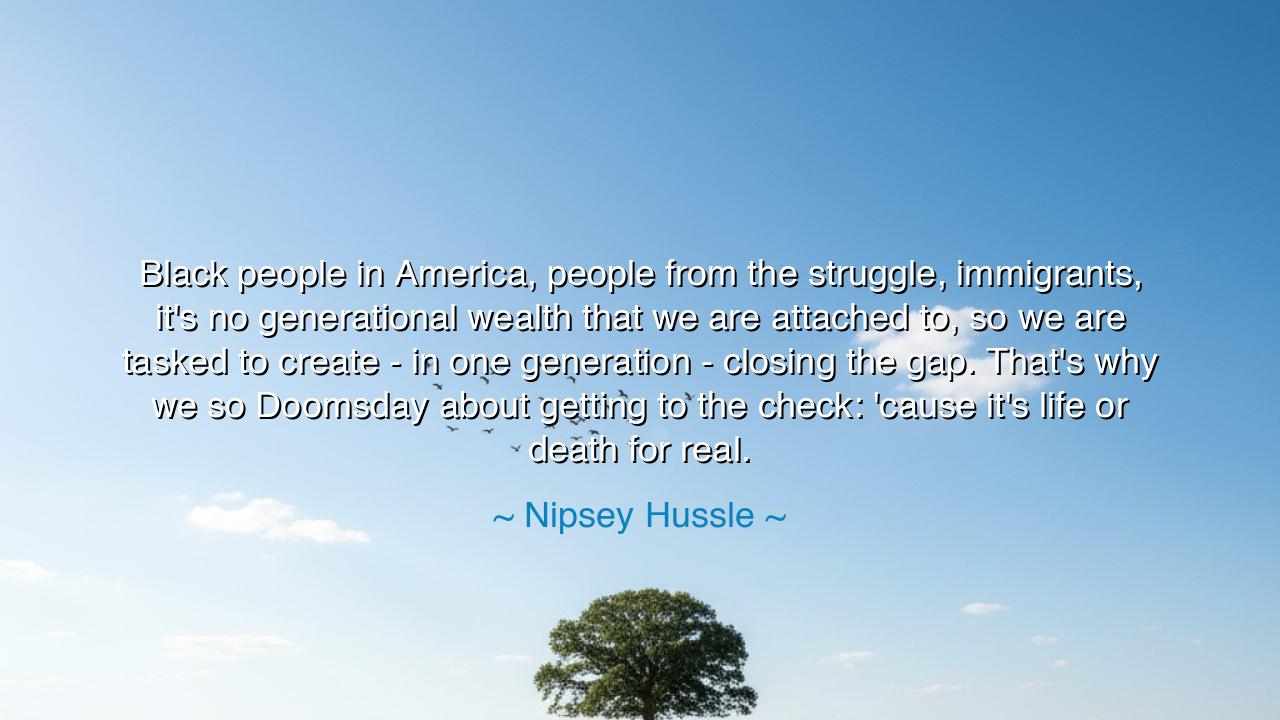
Black people in America, people from the struggle, immigrants
Black people in America, people from the struggle, immigrants, it's no generational wealth that we are attached to, so we are tasked to create - in one generation - closing the gap. That's why we so Doomsday about getting to the check: 'cause it's life or death for real.






“Black people in America, people from the struggle, immigrants, it's no generational wealth that we are attached to, so we are tasked to create—in one generation—closing the gap. That's why we so Doomsday about getting to the check: 'cause it's life or death for real.” Thus spoke Nipsey Hussle, the warrior-poet of the streets, whose voice carried the weight of centuries and the rhythm of survival. His words are not mere reflection; they are prophecy—a declaration of the reality faced by millions born into scarcity, born into struggle, yet determined to rise. In these lines, Nipsey speaks the truth of a people robbed of inheritance but rich in resilience, compelled to build from dust what others received as legacy.
In this statement lies both a cry and a calling. “No generational wealth that we are attached to”—here, he names the wound left by history. For centuries, systems of enslavement, segregation, and exclusion denied Black Americans and many immigrants the right to own, to pass on, to preserve. While others inherited land, business, and privilege, these communities inherited debt, displacement, and struggle. To them, wealth is not a given—it is a fight. And so, as Nipsey says, they are “tasked to create—in one generation—closing the gap.” Imagine the weight of that duty: to build in one lifetime what others have been stacking for five or six. It is not ambition alone—it is survival.
Nipsey Hussle himself embodied this truth. Born Ermias Asghedom to an Eritrean father and African American mother in the rough streets of South Los Angeles, he saw early how poverty could cage potential. Yet he refused to bow. He built his career brick by brick, not only in music but in business—creating his own record label, his own clothing store, his own blueprint for economic independence. He invested in his community, buying property in the same neighborhood where he once sold mixtapes. His vision was not of escape, but of empowerment. He believed that true revolution was ownership—that the truest victory for those denied wealth was to build it, to pass it on, to turn pain into prosperity.
When Nipsey speaks of being “Doomsday about getting to the check,” he does not glorify greed, but urgency. For the poor, for the marginalized, money is not luxury—it is life or death. It is the difference between feeding a child or burying one, between opportunity and oppression. To those who start with nothing, wealth is not mere accumulation—it is liberation. It means safety, autonomy, and dignity. Nipsey’s people, the “people from the struggle,” are not chasing excess; they are chasing existence. To them, the pursuit of the check is sacred labor—a fight to break the chains that bound their ancestors.
History bears witness to this struggle. Consider Madam C.J. Walker, born to formerly enslaved parents, who rose from poverty to become America’s first self-made woman millionaire. She built her empire not in luxury, but in service to her people—creating jobs, teaching business, and showing that wealth, once built, could become a weapon of restoration. Like Nipsey, she understood that money, in the hands of the oppressed, becomes power, becomes freedom. Their stories, separated by a century, sing the same truth: that to create wealth from nothing is not greed—it is an act of resistance, a rebellion against history itself.
Nipsey’s words also carry the rhythm of urgency and warning. For he knew that the system still hungers, that the gap remains wide and dangerous. When he says it is “life or death for real,” he means that the stakes are not metaphorical. Poverty kills—through stress, through violence, through lack of access to healthcare, to education, to opportunity. To rise above it is to fight for breath. His tone—intense, unrelenting—is not despair, but determination. He speaks as a general rallying his soldiers, reminding them that their labor, their hustle, their grind, are not vanity but necessity.
And yet, within this fire, there is hope. Nipsey Hussle dreamed of a world where this burden could one day be lifted—where future generations would inherit not poverty, but possibility. He worked not just for his own wealth, but to teach others how to build theirs—to turn the hustle into legacy, the struggle into strength. His vision was not just of money, but of mindset—of unity, discipline, and knowledge as the true engines of transformation. He saw that the long road to justice begins not in protest alone, but in creation—in making what was denied.
So, O listener, take this teaching into your heart: you are the builder of your own dynasty. If you come from struggle, do not curse it—use it. Let your hunger sharpen your purpose, but let your purpose extend beyond yourself. Build for your children, for your community, for those who will come after you. Learn, save, create, invest—these are the new weapons of liberation. Nipsey Hussle’s words remind us that the race is long, but the legacy is eternal. The gap may not be closed in one lifetime, but each brick laid brings us closer to freedom. And though he is gone, his spirit still speaks: “The Marathon continues.”






AAdministratorAdministrator
Welcome, honored guests. Please leave a comment, we will respond soon